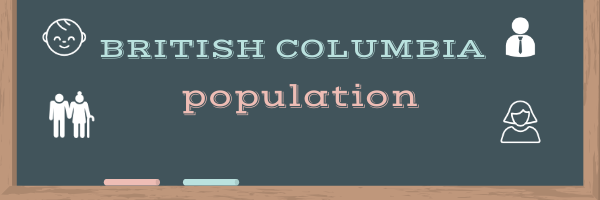
British Columbia (short for BC) is the 3rd most populated province in Canada with population over 4.8 million people. British Columbia’s population account for 13.22 percent of the country’s population. It is home to 3rd most populated city in Canada, Vancouver. British Columbia’s capital city is Victoria which is also one of the top 10 biggest city in Canada. British Columbia is one of the thirteen providences in Canada located in west side of Canada with area size of 922,503 km2.
Based on our research, British Columbia population will reach 5,052,437 (around 5 million) by the end of 2024.The calculation is based on the average growth rate of 1.07% over last 12 years since 2011. We believe using the recent years’ figures (see the table in next section) will make the estimation more accurate. The estimation will adjust once Statistic Canada publishes census data.
Population Growth of British Columbia
Looking back last twelve years of British Columbia’s population, the growth rate is very consistent and strong ranging from 1.01% to 1.13%, adding around 47,980 to 51,576 people each year to the overall population. Lot of workers was moving to British Columbia to take advantage of employment opportunities there, which contributes to the population growth. On the other hand, British Columbia is a very popular city for immigrants. British Columbia has recorded the strongest population growth in 2012 (1.13%).
Between census year of 2011 and 2016, British Columbia’s population has increased 247,998 people or 5.64%.
| Year | Population | Growth Rate |
| 2011 | 4,400,057 | n/a |
| 2012 | 4,449,656 | 1.13% |
| 2013 | 4,498,626 | 1.10% |
| 2014 | 4,546,849 | 1.07% |
| 2015 | 4,596,479 | 1.09% |
| 2016 | 4,648,055 | 1.12% |
| 2017 | 4,696,035 | 1.03% |
| 2018 | 4,745,272 | 1.05% |
| 2019 | 4,795,392 | 1.08% |
| 2020 | 4,845,264 | 1.04% |
| 2021 | 4,894,302 | 1.01% |
| 2022 | 4,943,980 | 1.01% |
| 2023 | 4,998,990 | 1.11% |
Demographics of British Columbia
According to Canada census, British Columbia is an extremely diverse city, with a huge number of ethnic and cultural groups living there. According to 2016 census, most commonly ethnic origins include:English(26.39%),Canadian(19%),Scottish(18.88%),Irish(14.80%),German(13.23%),Chinese(11.84%),French(8.53%),Indian(6.78%),Ukrainian(5.03%) and Indigenous Canadian(4.83%).
In terms of language, according 2016 census, most spoken languages in British Columbia are as follows: English (70.52%),Punjabi(4.42%), Cantonese(4.31%), Mandarin(4.15%), Tagalog (Filipino)(1.75%),German(1.49%),French(1.23%),Korean(1.17%),Spanish(1.05%) and Persian(0.97%).
According 2001 census date, the religious makeup of British Columbia is: Christian(44.60%), No religious affiliation(44.10%), Sikh(4.70%), Buddhist(2.10%), Muslim(1.80%), Hindu(1.10%), Jewish(0.50%), Other religions(0.80%) and Aboriginal religions(0.20%).
Population Density of British Columbia
British Columbia’s population density is 5.02 people per kilo square meter.
Population Density of British Columbia
Based on 2016 Cesus data, here are the most populated cities in British Columbia. Canadian Statistics classify them as population are which requires population greater than 1,000 and population density not less than 400 people per square km2. Montreal is by far has the most population compared with other cities in British Columbia.
| Rank | City | 2016 Census |
| 1 | Vancouver | 2,264,823 |
| 2 | Victoria | 335,696 |
| 3 | Kelowna | 151,957 |
| 4 | Abbotsford | 121,279 |
| 5 | White Rock | 93,729 |
| 6 | Nanaimo | 92,004 |
| 7 | Kamloops | 78,026 |
| 8 | Chilliwack | 73,161 |
| 9 | Prince George | 65,510 |
| 10 | Vernon | 48,073 |
| 11 | Courtenay | 45,018 |
| 12 | Campbell River | 35,138 |
| 13 | Penticton | 33,617 |
| 14 | Mission | 33,261 |
| 15 | Parksville | 23,574 |
| 16 | Duncan | 23,278 |
| 17 | Ladner | 22,193 |
| 18 | Tsawwassen | 21,588 |
| 19 | Port Alberni | 20,712 |
| 20 | Vancouver | 2,264,823 |
Facts About British Columbia
- BC’s Provincial flag is five by length and three by width, and electronic images of the flag must never be electronically or mechanically altered and must remain sized in scale.
- One in four North American grizzly bears is found in BC, and a fifth of all black bears in Canada are found in BC.
- The Hanging Garden Tree on Meares Island is believed to be one of the oldest known western red cedar trees and is estimated to be between 1,500 and 2,000 years old.
- British Columbia is the 5th largest province in Canada with a total area of 944,735 square kilometres (364,764 square miles).
- Stanley Park is a 405-hectare (1001-acre) public park surrounding downtown Vancouver.
- There are more than 400 national parks, recreation and conservation areas in British Columbia.
- The highest waterfall in all of Canada is on BC’s Vancouver Island.
- Half of all British Columbians live in the Vancouver metropolitan area.
References
The following links provide data for this topic:
- Statistics Canada: https://www12.statcan.gc.ca
- Government of British Columbia: https://www2.gov.bc.ca
